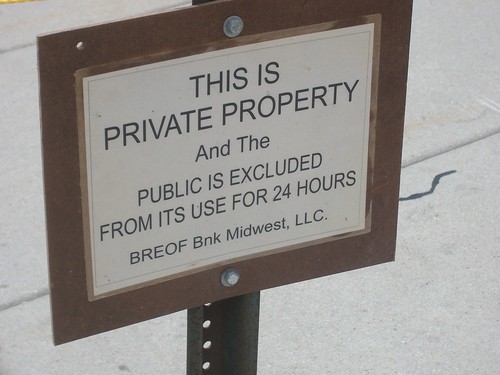
This sign was placed outside Chase Bank headquarters in downtown Milwaukee during a demonstration held by the Bail Out the People Movement in Wisconsin. The protest called for a moratorium on foreclosures. (Photo: Abayomi Azikiwe), a photo by Pan-African News Wire File Photos on Flickr.
JPMorgan probed over possible power market manipulation
Tue, Jul 3 2012
By Scott DiSavino and David Sheppard
NEW YORK (Reuters) - U.S. energy regulators have subpoenaed JPMorgan Chase & Co to produce 25 internal emails as part of an investigation into whether the bank manipulated electricity markets in California and the Midwest.
The Federal Energy Regulatory Commission (FERC), which has recently stepped up its efforts to end manipulation of U.S. power markets, filed a petition in federal court on Monday to require the bank to produce emails from 2010 and 2011 as part of a formal investigation into the bank's power trading.
News of the subpoena follows a series of more advanced probes of other big Wall Street banks and a record $245 million penalty against Constellation Energy that have sent shudders through electric markets this year, rekindling memories of the California power crisis and Enron melt-down a decade ago.
The inquiry also comes at a delicate moment for JPMorgan, already facing losses from its disastrous "London Whale" derivative trades that could amount to as much as $6 billion.
FERC does not normally disclose investigations, but it chose to subpoena JPMorgan after the bank claimed emails - some between commodities chief Blythe Masters and head of principal commodity investments Francis Dunleavy - were protected by attorney-client privilege, which the regulator disputes.
"The investigation focuses on JPMorgan bidding practices that may have been designed to manipulate the California and Midwest electricity markets," FERC lawyers said in the subpoena.
"Any such improper payments to generators are ultimately borne by the households, businesses, and government entities that are the end consumers of electricity."
FERC said it is also looking at whether the bank has tried to stall the investigation by not engaging in truthful communications with the commission.
The inquiry follows complaints from grid operators in California and the Midwest in 2011 that JPMorgan's traders may have bid up electricity prices by more than $73 million. FERC has not yet found if there was any wrongdoing.
"We have been responding to a FERC investigation into certain activities in our federally approved power business," JPMorgan spokeswoman Jennifer Zuccarelli said in an email.
"We stress that this investigation is ongoing and that no conclusions have been reached or findings adjudicated. We welcome the court's assistance in resolving this dispute over documents," Zuccarelli said.
EMAIL CHAIN
At the center of the subpoena is a dispute over client-attorney privilege. Court papers and exhibits show that JPMorgan repeatedly told FERC's Office of Enforcement that 53 emails the regulator sought from the bank were protected.
JPMorgan produced 20 emails in May after FERC told the bank it intended to seek judicial review of the emails. The bank produced another eight emails in June, the court papers said.
"A party that has knowingly and repeatedly assured a federal agency that documents are privileged, when there was no good faith basis for a privilege claim, is entitled to no credibility when it makes similar privilege claims about other documents," FERC said in the court filing.
In one of the emails revealed by FERC in the court filing, Dunleavy, head of principal investments within the bank's commodities group, told commodity chief Masters that he will "handle" the matter but said "it may not be pretty."
The bank maintains the remaining 25 emails are protected under client-attorney privilege.
STEPPED-UP ENFORCEMENT
FERC's Office of Enforcement, run by Norman Bay, has stepped up its game lately, taking the lead among regulators in cracking down on trades that cross both physical and financial markets.
In March, FERC hit Constellation Energy with a record $135 million civil penalty and forced the company to return $110 million to settle charges of power market manipulation in the U.S. Northeast in 2007 and 2008. Constellation settled prior to its merger with Exelon Corp of Chicago.
Over the past several months, FERC has announced "notices of alleged violations" by units of Barclays Bank, in April, and Deutsche Bank, last December. The JPMorgan enquiry has not yet reached this stage, which signals that an enforcement action is likely.
Unlike the often brazen trading ploys that were exposed on phone tapes and emails after the 2001 power trading crisis, more nuanced strategies, some of which have been considered commonplace in related markets, have been FERC's latest focus.
With Constellation, for example, it alleged the company used the physical market trades to benefit its financial positions.
Tom Olson, a Harvard Law School-educated enforcement attorney at FERC, who describes himself on his LinkedIn profile as a "tireless defender of the nation's energy systems," is the lead investigator for the alleged manipulation of power markets in the Midwest, according to the court papers.
(Additional reporting by Dan Wilchins; Editing by Jeffrey Benkoe, Alden Bentley and Styeve Orlofsky)
No comments:
Post a Comment